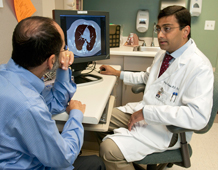Breathing new life into fight against respiratory disorders
Chronic obstructive pulmonary disease is a respiratory disorder that affects 25 million patients in the United States and causes more than 100,000 deaths per year, making it the country's fourth most common cause of death. Each year, it results in 700,000 hospitalizations and costs more than $30 billion to treat.
Studies to identify treatments for patients with COPD focus on the efficacy of one treatment over another in narrowly defined subsets of patients and in research settings. This is the case for most disorders. Such "efficacy studies" provide a well-defined research environment in which it is easier to measure how well new treatments might work. Unfortunately, fewer than 10% of patients with COPD qualify for efficacy studies. For example, efficacy research has generally excluded patients with other serious health conditions, even though most COPD patients have depression, heart disease, diabetes or other disorders. Therefore, it's not clear if efficacy studies provide the information needed to make healthcare decisions for typical COPD patients.
This is one of the many gaps in knowledge about COPD that Jerry Krishnan, MD, PhD, Associate Professor of Medicine and Health Studies at the University of Chicago Medical Center, and his colleagues are determined to fill thanks, in part, to a two-year ARRA grant from the National Institutes of Health for $7,439,784. That's the largest amount of money ever awarded for "comparative effectiveness research" in COPD. Unlike efficacy studies, comparative effectiveness research develops and disseminates evidence-based information to patients, clinicians and other decision makers, responding to their expressed needs about which interventions are most effective for which patients and under what circumstances.
The new grant is designed to develop a national research infrastructure for COPD comparative effectiveness research that will serve as a platform for conducting large-scale clinical trials and observational studies in a representative sample of COPD patients.
"Our goal is to conduct studies that improve the care and outcomes of patients with COPD," says Principal Investigator Krishnan.
Emphasis on patients
The interdisciplinary, multi-institution grant will cover COPD treatment across the spectrum of care, including care initiated in homes, clinics, emergency departments, hospitals, intensive care units and at end-of-life. This work is informed by the needs of a diverse group of stakeholders, including specialists and primary care physicians, government agencies, quality improvement organizations, managed care — and, most importantly, patients and patient advocacy groups.
"Efficacy research has focused on the disease; comparative effectiveness research focuses on the patient," Krishnan says. "We want to improve outcomes based on what's important to patients."
CONCERT, the COPD Outcomes-based Network for Clinical Effectiveness and Research Translation (www.kpchr.org/concert), is implementing the grant. This consortium of investigators developed in 2007 and headed by Krishnan includes the University of Chicago; Mercy Hospital and Medical Center; University of Washington; Veterans Administration at Puget Sound; University of North Carolina at Chapel Hill; Northwestern University; Baystate Health; and Kaiser Permanente Center for Health Research.
The grant is providing support for 16 investigators and 46 researchers across the consortium. Members of the consortium are seeking additional funds to conduct the research that this planning grant will layout.
"Our consortium represents a collaborative environment between those who generate, disseminate and use new knowledge about COPD," Krishnan says. "We believe that this infrastructure will provide a premier platform for ground-breaking, high-impact comparative effectiveness research in COPD."
by Greg Borzo
This award is funded under the American Recovery and Reinvestment Act of 2009, NIH Award number: 1RC2HL101618-01. For more information on NIH's Recovery Act projects, visit http://recovery.nih.gov/.

Associate Professor Jerry Krishnan, MD, PhD, (right) discusses findings of a chest CT with a patient. Krishnan and colleagues received a $7.4 million two-year ARRA NIH award to develop a national research infrastructure, including a registry (COPD DataHub), for studies that will improve the care and outcomes of patients with chronic obstructive pulmonary disease.
Photo by Lloyd DeGrane.










